- Home
- Charlotte Bronte
The Complete Novels of Charlotte Brontë Page 5
The Complete Novels of Charlotte Brontë Read online
Page 5
“Your decisions are perfectly judicious, madam,” returned Mr. Brocklehurst. “Humility is a Christian grace, and one peculiarly appropriate to the pupils of Lowood; I, therefore, direct that especial care shall be bestowed on its cultivation amongst them. I have studied how best to mortify in them the worldly sentiment of pride; and, only the other day, I had a pleasing proof of my success. My second daughter, Augusta, went with her mama to visit the school, and on her return she exclaimed: ‘Oh, dear papa, how quiet and plain all the girls at Lowood look, with their hair combed behind their ears, and their long pinafores, and those little holland pockets outside their frocks — they are almost like poor people’s children! and,’ said she, ‘they looked at my dress and mama’s, as if they had never seen a silk gown before.’”
“This is the state of things I quite approve,” returned Mrs. Reed; “had I sought all England over, I could scarcely have found a system more exactly fitting a child like Jane Eyre. Consistency, my dear Mr. Brocklehurst; I advocate consistency in all things.”
“Consistency, madam, is the first of Christian duties; and it has been observed in every arrangement connected with the establishment of Lowood: plain fare, simple attire, unsophisticated accommodations, hardy and active habits; such is the order of the day in the house and its inhabitants.”
“Quite right, sir. I may then depend upon this child being received as a pupil at Lowood, and there being trained in conformity to her position and prospects?”
“Madam, you may: she shall be placed in that nursery of chosen plants, and I trust she will show herself grateful for the inestimable privilege of her election.”
“I will send her, then, as soon as possible, Mr. Brocklehurst; for, I assure you, I feel anxious to be relieved of a responsibility that was becoming too irksome.”
“No doubt, no doubt, madam; and now I wish you good morning. I shall return to Brocklehurst Hall in the course of a week or two: my good friend, the Archdeacon, will not permit me to leave him sooner. I shall send Miss Temple notice that she is to expect a new girl, so that there will be no difficulty about receiving her. Goodbye.”
“Goodbye, Mr. Brocklehurst; remember me to Mrs. and Miss Brocklehurst, and to Augusta and Theodore, and Master Broughton Brocklehurst.”
“I will, madam. Little girl, here is a book entitled the ‘Child’s Guide,’ read it with prayer, especially that part containing ‘An account of the awfully sudden death of Martha G — -, a naughty child addicted to falsehood and deceit.’”
With these words Mr. Brocklehurst put into my hand a thin pamphlet sewn in a cover, and having rung for his carriage, he departed.
Mrs. Reed and I were left alone: some minutes passed in silence; she was sewing, I was watching her. Mrs. Reed might be at that time some six or seven and thirty; she was a woman of robust frame, square-shouldered and strong-limbed, not tall, and, though stout, not obese: she had a somewhat large face, the under jaw being much developed and very solid; her brow was low, her chin large and prominent, mouth and nose sufficiently regular; under her light eyebrows glimmered an eye devoid of ruth; her skin was dark and opaque, her hair nearly flaxen; her constitution was sound as a bell — illness never came near her; she was an exact, clever manager; her household and tenantry were thoroughly under her control; her children only at times defied her authority and laughed it to scorn; she dressed well, and had a presence and port calculated to set off handsome attire.
Sitting on a low stool, a few yards from her armchair, I examined her figure; I perused her features. In my hand I held the tract containing the sudden death of the Liar, to which narrative my attention had been pointed as to an appropriate warning. What had just passed; what Mrs. Reed had said concerning me to Mr. Brocklehurst; the whole tenor of their conversation, was recent, raw, and stinging in my mind; I had felt every word as acutely as I had heard it plainly, and a passion of resentment fomented now within me.
Mrs. Reed looked up from her work; her eye settled on mine, her fingers at the same time suspended their nimble movements.
“Go out of the room; return to the nursery,” was her mandate. My look or something else must have struck her as offensive, for she spoke with extreme though suppressed irritation. I got up, I went to the door; I came back again; I walked to the window, across the room, then close up to her.
Speak I must: I had been trodden on severely, and must turn: but how? What strength had I to dart retaliation at my antagonist? I gathered my energies and launched them in this blunt sentence —
“I am not deceitful: if I were, I should say I loved you; but I declare I do not love you: I dislike you the worst of anybody in the world except John Reed; and this book about the liar, you may give to your girl, Georgiana, for it is she who tells lies, and not I.”
Mrs. Reed’s hands still lay on her work inactive: her eye of ice continued to dwell freezingly on mine.
“What more have you to say?” she asked, rather in the tone in which a person might address an opponent of adult age than such as is ordinarily used to a child.
That eye of hers, that voice stirred every antipathy I had. Shaking from head to foot, thrilled with ungovernable excitement, I continued —
“I am glad you are no relation of mine: I will never call you aunt again as long as I live. I will never come to see you when I am grown up; and if any one asks me how I liked you, and how you treated me, I will say the very thought of you makes me sick, and that you treated me with miserable cruelty.”
“How dare you affirm that, Jane Eyre?”
“How dare I, Mrs. Reed? How dare I? Because it is the truth. You think I have no feelings, and that I can do without one bit of love or kindness; but I cannot live so: and you have no pity. I shall remember how you thrust me back — roughly and violently thrust me back — into the red-room, and locked me up there, to my dying day; though I was in agony; though I cried out, while suffocating with distress, ‘Have mercy! Have mercy, Aunt Reed!’ And that punishment you made me suffer because your wicked boy struck me — knocked me down for nothing. I will tell anybody who asks me questions, this exact tale. People think you a good woman, but you are bad, hard-hearted. You are deceitful!”
Ere I had finished this reply, my soul began to expand, to exult, with the strangest sense of freedom, of triumph, I ever felt. It seemed as if an invisible bond had burst, and that I had struggled out into unhoped-for liberty. Not without cause was this sentiment: Mrs. Reed looked frightened; her work had slipped from her knee; she was lifting up her hands, rocking herself to and fro, and even twisting her face as if she would cry.
“Jane, you are under a mistake: what is the matter with you? Why do you tremble so violently? Would you like to drink some water?”
“No, Mrs. Reed.”
“Is there anything else you wish for, Jane? I assure you, I desire to be your friend.”
“Not you. You told Mr. Brocklehurst I had a bad character, a deceitful disposition; and I’ll let everybody at Lowood know what you are, and what you have done.”
“Jane, you don’t understand these things: children must be corrected for their faults.”
“Deceit is not my fault!” I cried out in a savage, high voice.
“But you are passionate, Jane, that you must allow: and now return to the nursery — there’s a dear — and lie down a little.”
“I am not your dear; I cannot lie down: send me to school soon, Mrs. Reed, for I hate to live here.”
“I will indeed send her to school soon,” murmured Mrs. Reed sotto voce ; and gathering up her work, she abruptly quitted the apartment.
I was left there alone — winner of the field. It was the hardest battle I had fought, and the first victory I had gained: I stood awhile on the rug, where Mr. Brocklehurst had stood, and I enjoyed my conqueror’s solitude. First, I smiled to myself and felt elate; but this fierce pleasure subsided in me as fast as did the accelerated throb of my pulses. A child cannot quarrel with its elders, as I had done; cannot give its furious feelings unco
ntrolled play, as I had given mine, without experiencing afterwards the pang of remorse and the chill of reaction. A ridge of lighted heath, alive, glancing, devouring, would have been a meet emblem of my mind when I accused and menaced Mrs. Reed: the same ridge, black and blasted after the flames are dead, would have represented as meetly my subsequent condition, when half-an-hour’s silence and reflection had shown me the madness of my conduct, and the dreariness of my hated and hating position.
Something of vengeance I had tasted for the first time; as aromatic wine it seemed, on swallowing, warm and racy: its after-flavour, metallic and corroding, gave me a sensation as if I had been poisoned. Willingly would I now have gone and asked Mrs. Reed’s pardon; but I knew, partly from experience and partly from instinct, that was the way to make her repulse me with double scorn, thereby re-exciting every turbulent impulse of my nature.
I would fain exercise some better faculty than that of fierce speaking; fain find nourishment for some less fiendish feeling than that of sombre indignation. I took a book — some Arabian tales; I sat down and endeavoured to read. I could make no sense of the subject; my own thoughts swam always between me and the page I had usually found fascinating. I opened the glass-door in the breakfast-room: the shrubbery was quite still: the black frost reigned, unbroken by sun or breeze, through the grounds. I covered my head and arms with the skirt of my frock, and went out to walk in a part of the plantation which was quite sequestrated; but I found no pleasure in the silent trees, the falling fir-cones, the congealed relics of autumn, russet leaves, swept by past winds in heaps, and now stiffened together. I leaned against a gate, and looked into an empty field where no sheep were feeding, where the short grass was nipped and blanched. It was a very grey day; a most opaque sky, “onding on snaw,” canopied all; thence flakes felt it intervals, which settled on the hard path and on the hoary lea without melting. I stood, a wretched child enough, whispering to myself over and over again, “What shall I do? — what shall I do?”
All at once I heard a clear voice call, “Miss Jane! where are you? Come to lunch!”
It was Bessie, I knew well enough; but I did not stir; her light step came tripping down the path.
“You naughty little thing!” she said. “Why don’t you come when you are called?”
Bessie’s presence, compared with the thoughts over which I had been brooding, seemed cheerful; even though, as usual, she was somewhat cross. The fact is, after my conflict with and victory over Mrs. Reed, I was not disposed to care much for the nursemaid’s transitory anger; and I was disposed to bask in her youthful lightness of heart. I just put my two arms round her and said, “Come, Bessie! don’t scold.”
The action was more frank and fearless than any I was habituated to indulge in: somehow it pleased her.
“You are a strange child, Miss Jane,” she said, as she looked down at me; “a little roving, solitary thing: and you are going to school, I suppose?”
I nodded.
“And won’t you be sorry to leave poor Bessie?”
“What does Bessie care for me? She is always scolding me.”
“Because you’re such a queer, frightened, shy little thing. You should be bolder.”
“What! to get more knocks?”
“Nonsense! But you are rather put upon, that’s certain. My mother said, when she came to see me last week, that she would not like a little one of her own to be in your place. — Now, come in, and I’ve some good news for you.”
“I don’t think you have, Bessie.”
“Child! what do you mean? What sorrowful eyes you fix on me! Well, but Missis and the young ladies and Master John are going out to tea this afternoon, and you shall have tea with me. I’ll ask cook to bake you a little cake, and then you shall help me to look over your drawers; for I am soon to pack your trunk. Missis intends you to leave Gateshead in a day or two, and you shall choose what toys you like to take with you.”
“Bessie, you must promise not to scold me any more till I go.”
“Well, I will; but mind you are a very good girl, and don’t be afraid of me. Don’t start when I chance to speak rather sharply; it’s so provoking.”
“I don’t think I shall ever be afraid of you again, Bessie, because I have got used to you, and I shall soon have another set of people to dread.”
“If you dread them they’ll dislike you.”
“As you do, Bessie?”
“I don’t dislike you, Miss; I believe I am fonder of you than of all the others.”
“You don’t show it.”
“You little sharp thing! you’ve got quite a new way of talking. What makes you so venturesome and hardy?”
“Why, I shall soon be away from you, and besides” — I was going to say something about what had passed between me and Mrs. Reed, but on second thoughts I considered it better to remain silent on that head.
“And so you’re glad to leave me?”
“Not at all, Bessie; indeed, just now I’m rather sorry.”
“Just now! and rather! How coolly my little lady says it! I dare say now if I were to ask you for a kiss you wouldn’t give it me: you’d say you’d rather not.”
“I’ll kiss you and welcome: bend your head down.” Bessie stooped; we mutually embraced, and I followed her into the house quite comforted. That afternoon lapsed in peace and harmony; and in the evening Bessie told me some of her most enchanting stories, and sang me some of her sweetest songs. Even for me life had its gleams of sunshine.
CHAPTER V
Table of Contents
Five o’clock had hardly struck on the morning of the 19th of January, when Bessie brought a candle into my closet and found me already up and nearly dressed. I had risen half-an-hour before her entrance, and had washed my face, and put on my clothes by the light of a half-moon just setting, whose rays streamed through the narrow window near my crib. I was to leave Gateshead that day by a coach which passed the lodge gates at six a.m. Bessie was the only person yet risen; she had lit a fire in the nursery, where she now proceeded to make my breakfast. Few children can eat when excited with the thoughts of a journey; nor could I. Bessie, having pressed me in vain to take a few spoonfuls of the boiled milk and bread she had prepared for me, wrapped up some biscuits in a paper and put them into my bag; then she helped me on with my pelisse and bonnet, and wrapping herself in a shawl, she and I left the nursery. As we passed Mrs. Reed’s bedroom, she said, “Will you go in and bid Missis good-bye?”
“No, Bessie: she came to my crib last night when you were gone down to supper, and said I need not disturb her in the morning, or my cousins either; and she told me to remember that she had always been my best friend, and to speak of her and be grateful to her accordingly.”
“What did you say, Miss?”
“Nothing: I covered my face with the bedclothes, and turned from her to the wall.”
“That was wrong, Miss Jane.”
“It was quite right, Bessie. Your Missis has not been my friend: she has been my foe.”
“O Miss Jane! don’t say so!”
“Goodbye to Gateshead!” cried I, as we passed through the hall and went out at the front door.
The moon was set, and it was very dark; Bessie carried a lantern, whose light glanced on wet steps and gravel road sodden by a recent thaw. Raw and chill was the winter morning: my teeth chattered as I hastened down the drive. There was a light in the porter’s lodge: when we reached it, we found the porter’s wife just kindling her fire: my trunk, which had been carried down the evening before, stood corded at the door. It wanted but a few minutes of six, and shortly after that hour had struck, the distant roll of wheels announced the coming coach; I went to the door and watched its lamps approach rapidly through the gloom.
“Is she going by herself?” asked the porter’s wife.
“Yes.”
“And how far is it?”
“Fifty miles.”
“What a long way! I wonder Mrs. Reed is not afraid to trust her so far alone.”
The coach drew up; there it was at the gates with its four horses and its top laden with passengers: the guard and coachman loudly urged haste; my trunk was hoisted up; I was taken from Bessie’s neck, to which I clung with kisses.
“Be sure and take good care of her,” cried she to the guard, as he lifted me into the inside.
“Ay, ay!” was the answer: the door was slapped to, a voice exclaimed “All right,” and on we drove. Thus was I severed from Bessie and Gateshead; thus whirled away to unknown, and, as I then deemed, remote and mysterious regions.
I remember but little of the journey; I only know that the day seemed to me of a preternatural length, and that we appeared to travel over hundreds of miles of road. We passed through several towns, and in one, a very large one, the coach stopped; the horses were taken out, and the passengers alighted to dine. I was carried into an inn, where the guard wanted me to have some dinner; but, as I had no appetite, he left me in an immense room with a fireplace at each end, a chandelier pendent from the ceiling, and a little red gallery high up against the wall filled with musical instruments. Here I walked about for a long time, feeling very strange, and mortally apprehensive of some one coming in and kidnapping me; for I believed in kidnappers, their exploits having frequently figured in Bessie’s fireside chronicles. At last the guard returned; once more I was stowed away in the coach, my protector mounted his own seat, sounded his hollow horn, and away we rattled over the “stony street” of L-.

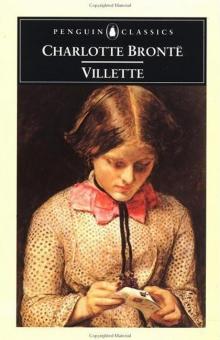 Villette
Villette Stancliffe's Hotel
Stancliffe's Hotel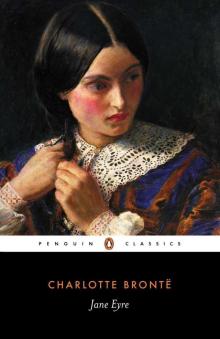 Jane Eyre
Jane Eyre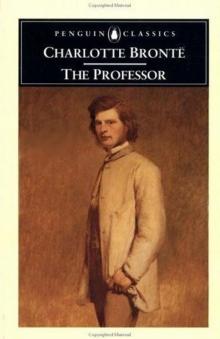 The Professor
The Professor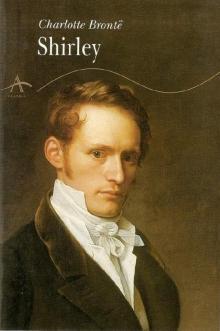 Shirley
Shirley The Complete Novels of Charlotte Brontë
The Complete Novels of Charlotte Brontë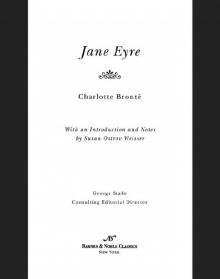 Jane Eyre (Barnes & Noble Classics Series)
Jane Eyre (Barnes & Noble Classics Series)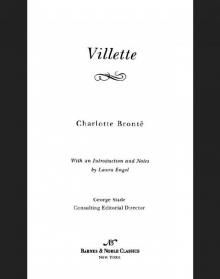 Villette (Barnes & Noble Classics Series)
Villette (Barnes & Noble Classics Series)